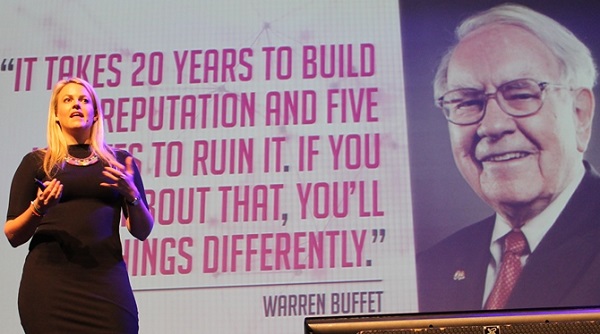
Legal, disciplinary and reputational risks that stem from social media abuse

A media law expert from Johannesburg, Emma Sadleir, last week told a Windhoek audience posting incriminating information and images on any social media platform, is akin to posting the same on a public billboard.
“Initially, I would tell people that if they would not put a certain message on a massive billboard with their picture and all information, then don’t put it online. But now it has changed. Still, if you won’t put it on a billboard, do not put it on your digital device,” Sadleir cautioned during her opening remarks.
Sadleir did a presentation on the implications of social media abuse for both organisations and individuals. She was the guest of Standard Bank Namibia.
“There are serious legal implications that can stem from messages or images that people post on social media, which can have negative implications in the real world” she warned.
She explained that digital devices such as smart phones are dangerous because they possess three features; the internet, screenshot capabilities and a camera. The internet offers a permanent public platform; screenshots render transit communication permanent and camera’s document everything. Once this content is on these digital devices it can be accessed by various social media sites or is at risk of stolen by hackers.
Historically, people only had to be concerned about their conduct at the office during working hours, however now they have to consider their online activities as well, Sadleir stressed pointing out that employers can use this social media information to take disciplinary action against their employee, even if it was posted in a personal capacity. Furthermore, legal action can be taken by those affected by the posts.
“You are responsible for everything on your social media pages, even though you have not written it yourself, because you have the power to delete it if you do not agree with it. We need to protect ourselves online like the celebrities we have become. Your personal safety should come first,” she emphasized.
Sadleir explained that if any content is posted online and seen only by one person, the legal implications become the same as something that has been plastered on the front page of a newspaper. Issues of privacy, defamation or illegally disseminating pornographic material come in to play.
She further pointed out that the page owner loses context, tone and control over his or her audience when online. “If you do anything illegal or obscene it can be documented and put online, even though it was meant as a joke which can result in legal and disciplinary action.”
Although some people might feel like their right to privacy has been infringed in some instances on social media, she stated that unless they have established a reasonable explanation for privacy, issues of consent and public interest could be used to counter that argument.
“If you do not look after your privacy, you will not have any. If you have never been on social media you have a higher expectation of privacy than someone who is,” Sadleir highlighted.
“There are two things to be cognisant of on social media, one’s digital footprint and one’s digital shadow. The digital footprint is what you post about yourself online making it easy to control and the digital shadow is what other people post about you, which is hard to control. What is private today will not be private tomorrow, she said, so if you do not consent to a post about you being online or do not want it to be associated with you, then you [must] explicitly state it and have it removed.
“All laws that apply in real life apply to social media…This also extends to oaths of ethics and professional codes, industry regulations and guidelines, and contractual obligations. Unfortunately we are breeding a generation of digital natives who only know about life online not knowing that these online activities can get them into trouble in real life,” she reiterated.
Citing various cases in which people lost their jobs, their social and their political standing as a result of content posted on social media, Sadleir urged all social media users not to do anything that puts their employers in disrepute online. “Remember, this becomes part of the chain of publishing of any content on your profile” she warned.
Sadleir read a BA LLB at the University of the Witwaterrand and an LLM in IT, Media and Communications Law (Cum Laude) at the London School of Economics.












































